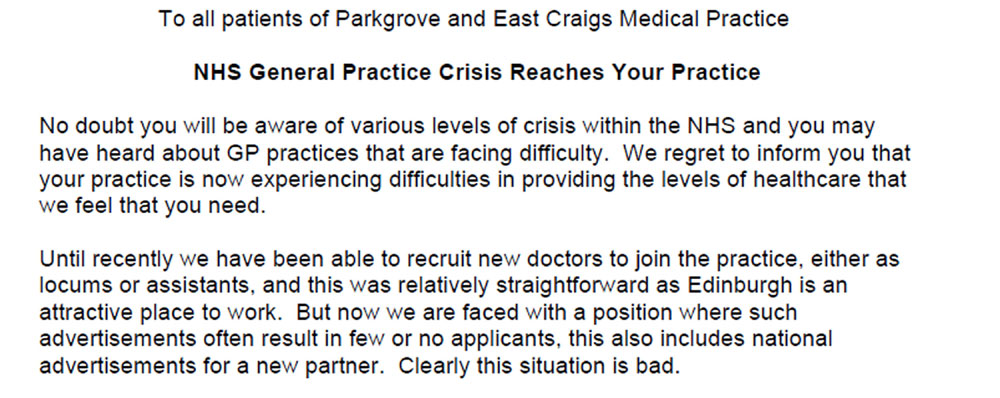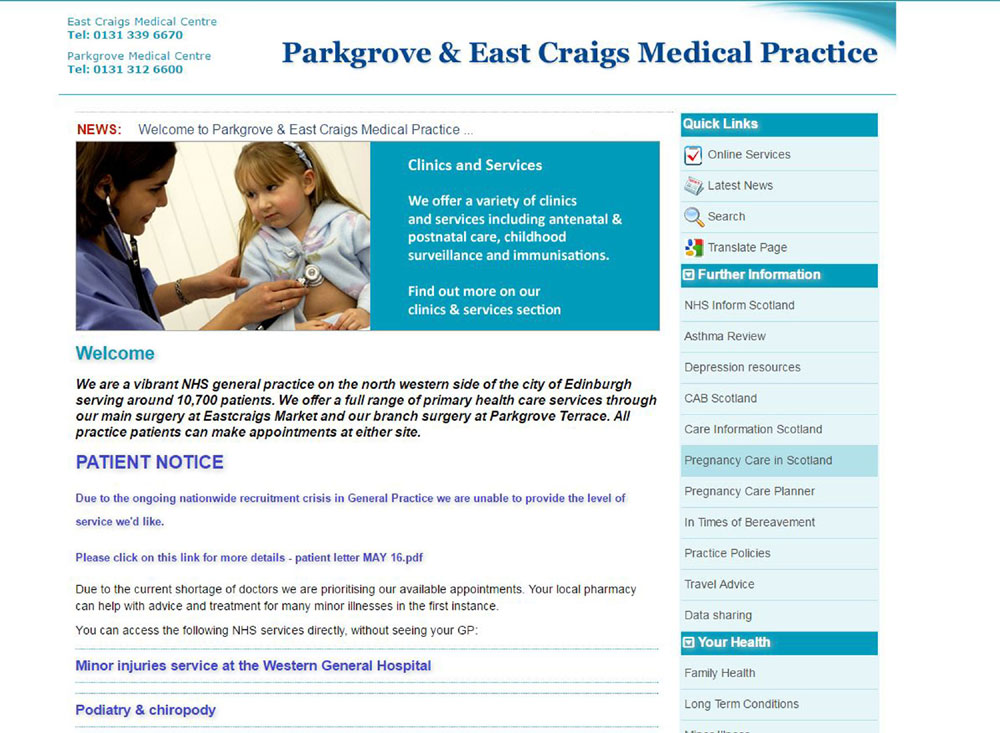A GPs’ surgery has published a searing open letter on its website, blaming the government and health officials for the “crisis” facing their patients.
Parkgrove and East Craigs Medical Practice, in Clermiston, Edinburgh, serves 10,700 patients buts says it can’t recruit sufficient staff.
The letter warns those tring to book appointments: “Due to the ongoing nationwide recruitment crisis in general practice we are unable to provide the level of service we’d like.”
The letter itself tells patients that despite numerous attempts to recruit doctors they are failing to fill positions thanks to “negative publicity from the government about the role of GPs”.
According to the the letter – penned by partners of the practice – such publicity means that general practice medicine is no longer attractive to junior doctors, whilst senior staff are taking early retirement.
It also tells patients that they should perhaps “fear for the future” of NHS GP services.
And it even takes the radical step of encouraging patients to contact their local MSP and the chief of NHS Lothian – going as far as handing out their email addresses.

The letter – originally posted two months ago – reads: “Until recently we have been able to recruit new doctors to join the practice, either as locums or assistants, and this was relatively straightforward as Edinburgh is an attractive place to work.
“But now we are faced with a position where such advertisements often result in few or no applicants, this also includes national advertisements for a new partner. Clearly this situation is bad.
“This position has arisen for a number of reasons. Mainly this is due to a problem of recruiting suitable healthcare professionals, particularly doctors.
“This problem has been building up for several years as a result of negative publicity from the government about the role of GPs and also their perceived impact on hospital waiting times.
“Underpinning this there has been a real underinvestment in primary care services in Lothian.
“Despite this being brought to the attention of the relevant bodies e.g. health boards and Scottish Government no action has been forthcoming.
“The end result is that general practice is now no longer an attractive postgraduate career and many fully trained junior doctors choose other career paths and a number of senior doctors are choosing to take early retirement.

“If you fear for the future of your NHS GP services, as perhaps you should, you can contact your new MSP Alex Cole-Hamilton by email.”
The letter also provides the personal email addresses of Tim Davison – the chief executive of NHS Lothian – and Alex Cole-Hamilton.
It also provides various ways that patients requiring attention can reduce the overall strain on the GPs office.
Online various advertisements for GP positions at the practice can be seen – with salaries in the region of £64,000.
Salaries for more junior GPs start in the range of £55,000 – suggesting that NHS Lothian bosses have drastically bumped up the salary in a desperate bid to attract interest.
One advert reads “New pay and conditions!” – also implying that it is not the first time the post has been advertised.
The automated phone reception message of the surgery also warns those calling to make appointments: “Due to GP shortages the number of available appointments will be significantly reduced.
“During this time we will be prioritising those with the greatest clinical need.”
The practice is so hard-pressed, doctors sometimes turn down home requests visits from an 89-year-old woman living 40 metres away.
A home carer at the woman’s bungalow, who asked not to be named, said: “Usually for an older person if you phone the doctor you want the visit the next day or a house call, but they’re really hardly doing that now.
“I think it’s really bad because if you’ve got somebody where their legs are swollen and they’re really not well, they say, ‘Oh we’ve not got anything to do.’ You know, come on. This is an 89 year old lady. You’re really wanting a service and you’re not getting it.”
Gail Gormley, 57, suffers from lupus and arthritis in the back and knee. She said the waiting period for an appointment is up to two weeks because there are “hardly any” doctors.
“There’s only basically two real doctors on and it’s maybe a locum as well”, she explained.
“And then they tell you to go to the chemist if it’s not anything really serious. You go to the chemist and sometimes they say go to your doctor, but you can’t get an appointment with your doctor. It’s a catch 22 situation really.”
Irene Lodge, 70, said: “I know that people are finding it difficult to get appointments and a lot of people are complaining because a lot of the people are elderly.”
George Walker, chair of Edinburgh Health and Social Care Partnership said: “The recruitment and retention of GPs, who are independent businesses run by GP partners, is a nationwide issue which affects every practice and health board.
“We are working closely with local GPs and the Scottish Government to find a long-term solution to ensure that patients continue to receive safe, effective and timely care.”
Lib Dem MSP Alex Cole-Hamilton said: “I have been contacted by a number of constituents.
“It’s terrible the situation they have up there. These GPs are working valiantly to keep up with demand but without an intake of new gps soon the situation will be unsustainable.
“This underscores the crisis in our GP workforce and I have raise this both with the first minister and the cabinet secretary.”
Deputy chair of BMA Scotland’s GP committee Dr Andrew Buist said: “GP practices across Scotland are struggling to fill vacant posts, with a recent BMA survey showing that as many as 28% of practices had at least one vacancy in June.
“These gaps are undoubtedly putting strain on remaining GPs who must struggle to cover the gaps in their practice while also coping with increasing demand for GP services.
“The Scottish Government urgently needs to commit to improving recruitment and retention, as well as to increased funding for general practice.”

